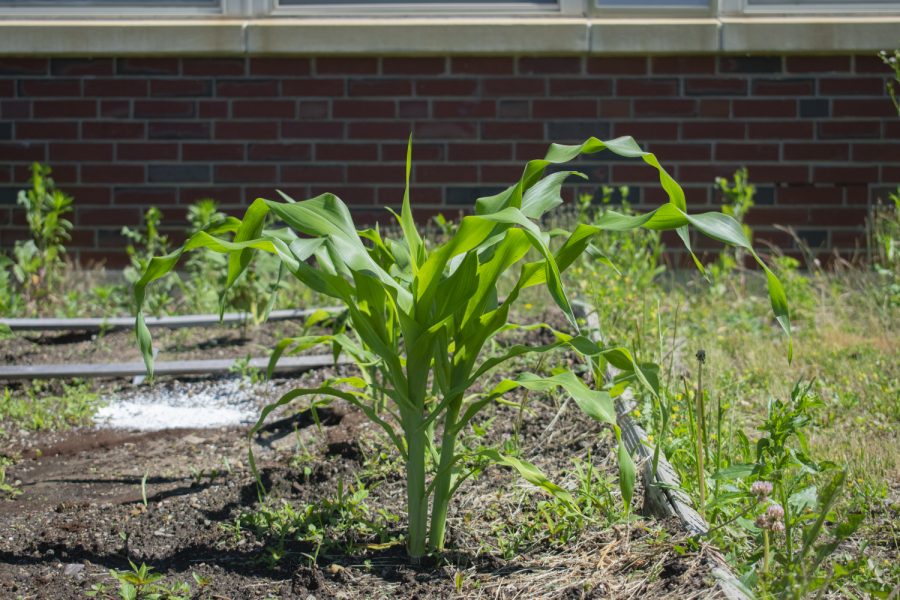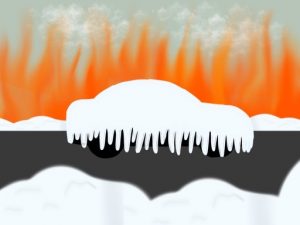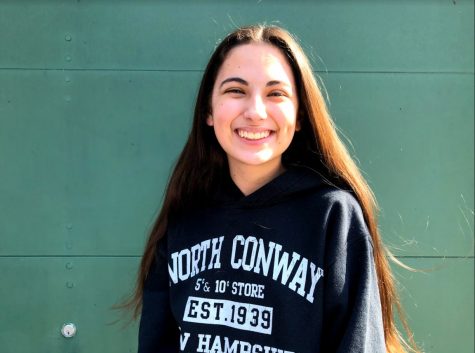Algonquin raises awareness about climate change
Corn growing from Applied Arts and Technology teacher Zbigniewa Giegucz’s Urban Gardening class. Growing vegetables helps the environment and reduces your carbon carbon footprint.
June 19, 2021
Students and faculty have been working hard in recent years to educate themselves and promote action to minimize some of the risks associated with climate change, but most agree there is still a long way to go.
By definition, climate change is the change in global or regional climate patterns. According to the United States Environmental Protection Agency’s article, “What Climate Change Means for Massachusetts,” the Commonwealth of Massachusetts has warmed by more than 2℉ in the last century. According to the States At Risk’s article, “Massachusetts Extreme Heat,” Massachusetts is among the top 10 fastest warming states in the country.
Because it can be difficult for students to educate themselves on the ever-changing topic, several individuals and groups in the school community have been working to make information easier to access. For example, the Green Earth Club, lead by co-presidents junior Joli Dantz and senior Ben Westphal, has been discussing the possibility of putting educational links on the school’s website for students to access. Additionally, Algonquin offers several Environmental Science courses.
“I took the half-year Environmental Science course, and it was very basic material, but it was very informative,” Dantz said. “It helped a lot, and it made me very interested in the environment.”
Even students who are not particularly interested in climate change or the environment can take the class to gain a more basic understanding of the topic.
“The half year Environmental Science course covers the basics of climate change, including what climate change is, what is causing it, how we know it is happening as a result of human behavior, effects of climate change on the planet and what we can do to reduce its effects,” Environmental Science teacher Chrissy Connolly said.
Urban Gardening, taught by Applied Arts and Technology teacher Zbysia Giegucz, touches upon many environmental topics as well. Many students including sophomore Audrey Long, freshman Zoe Manousos and freshman Madeline Ho have learned a lot from the class.
“When you grow your own fruits and vegetables, you can save a lot of energy and [prevent] the release of greenhouse gases because you’re saving trips to the grocery store and the trucks bringing the fruits and vegetables to the actual stores as well,” Ho said.
Even if students choose not to take Environmental Science, Connolly feels there is more the school could be doing to educate them.
“We can work [climate change] into other curriculums,” Connolly said. “I do know sometimes Physics or Chemistry teachers might mention it, but also in other classes. Maybe English classes, if they are able to read an article or book that deals with climate change.”
According to Connolly, education is important because most people living in Northborough or Southborough are not affected by climate change in everyday life, and are therefore able to easily ignore it. The reality is that communities in Massachusetts are already beginning to see consequences of climate change, and they will only get worse as time goes on.
“We start to have really dry summers, more intense storms, storms that give us a huge amount of rainfall all at once,” Connolly said. “All of the effects we are feeling now are going to increase.”
According to Connolly, once students are educated on what climate change is and the potential consequences it might bring, the next step is action. Many people don’t know where to start when it comes to taking action, or they feel intimidated by how large the task seems.
“Even just recycling or using reusable tupperware [can make an impact],” Dantz said.“Just doing little things like that or doing one small thing can lead to more and more [changes or actions].”
Some students were able to take advantage of the extra free time provided to most people during quarantine to be more environmentally conscious.
“I know at least for me, with COVID, I had a lot more free time so I started a garden at my house,” Long said. “I have heard of a lot of people who have done that because they have free time, and it is just a healthy alternative to going to the grocery store where they could use preservatives that might damage the Earth.”
As Dantz said, starting to help the environment does not need to be scary and can usually be easily incorporated into everyday life with minimal effort.
“One of the ways people can get involved is by starting to compost,” Manousos said. “It is good for the environment, and it is good for your garden and not wasting food. We could even start incorporating that into the school.”
In addition to composting, there are several other environmental projects the school’s faculty and staff have been working on, including the installation of solar panels.
“Certainly I am aware of our most high profile project, which is the solar panels project,” Principal Sean Bevan said. “That has been several years in development, and this is the first year we are actually able to draw power from that project.”
According to Bevan, this year has made it very hard to prioritize environmental issues due to a shift in focus on the pandemic and other urgent issues in our school. Still, the school continues to work hard to fight climate change.
“[The solar panels] have both practical benefits to the environment, but also cost-savings to our electrical bills,” Bevan said. “It’s one of those really magical solutions where it’s both practical and beneficial to the environment.”













